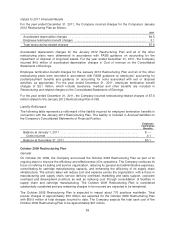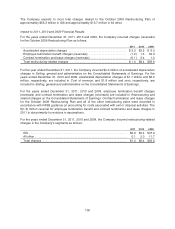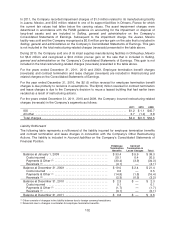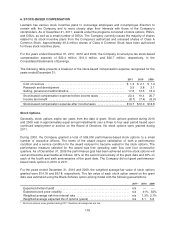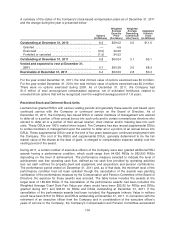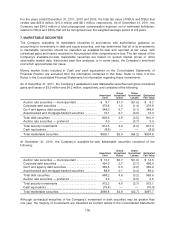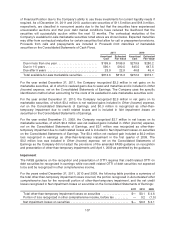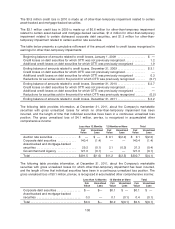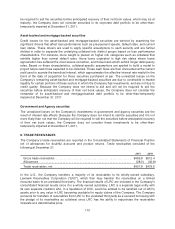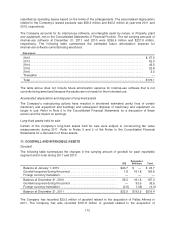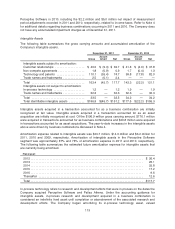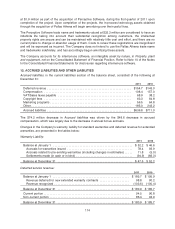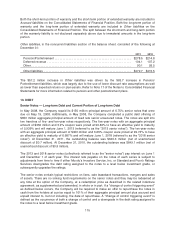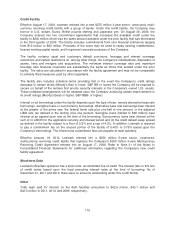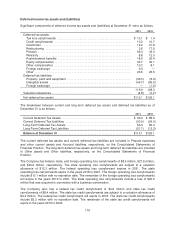Lexmark 2011 Annual Report Download - page 113
Download and view the complete annual report
Please find page 113 of the 2011 Lexmark annual report below. You can navigate through the pages in the report by either clicking on the pages listed below, or by using the keyword search tool below to find specific information within the annual report.
The following table provides information, at December 31, 2010, about the Company’s marketable
securities with gross unrealized losses for which no other-than-temporary impairment has been
incurred, and the length of time that individual securities have been in a continuous unrealized loss
position. The gross unrealized loss of $3.6 million, pre-tax, is recognized in accumulated other
comprehensive income:
Less than 12 Months 12 Months or More Total
Fair Unrealized Fair Unrealized Fair Unrealized
Value Loss Value Loss Value Loss
Auction rate securities ............... $ — $ — $15.9 $(2.4) $ 15.9 $(2.4)
Corporate debt securities ............ 183.7 (0.6) 5.4 — 189.1 (0.6)
Asset-backed and mortgage-backed
securities ....................... 30.9 (0.2) 3.8 (0.2) 34.7 (0.4)
Government and Agency ............ 163.4 (0.2) — — 163.4 (0.2)
Total ............................... $378.0 $(1.0) $25.1 $(2.6) $403.1 $(3.6)
The following table provides information, at December 31, 2010, about the Company’s marketable
securities with gross unrealized losses for which other-than-temporary impairment has been incurred,
and the length of time that individual securities have been in a continuous unrealized loss position. The
gross unrealized loss of $0.1 million, pre-tax, is recognized in accumulated other comprehensive
income:
Less than 12 Months 12 Months or More Total
Fair Unrealized Fair Unrealized Fair Unrealized
Value Loss Value Loss Value Loss
Corporate debt securities ............... $— $— $0.1 $(0.1) $0.1 $(0.1)
Asset-backed and mortgage-backed
securities .......................... — — 0.2 — 0.2 —
Total ................................ $— $— $0.3 $(0.1) $0.3 $(0.1)
Auction rate securities
The Company’s valuation process for its auction rate security portfolio begins with a credit analysis of
each instrument. Under this method, the security is analyzed for factors impacting its future cash flows,
such as the underlying collateral, credit ratings, credit insurance or other guarantees, and the level of
seniority of the specific tranche of the security. Future cash flows are projected incorporating certain
security specific assumptions such as the ratings outlook, the assumption that the auction market will
remain illiquid and that the security’s interest rate will continue to be set at the maximum applicable
rate, and that the security will not be redeemed until its mandatory redemption date. The methodology
for determining the appropriate discount rate uses market-based yield indicators and the underlying
collateral as a baseline for determining the appropriate yield curve, and then adjusting the resultant
rate on the basis of the credit and structural analysis of the security. The unrealized losses on the
Company’s auction rate portfolio are a result of the illiquidity in this market sector and are not due to
credit quality. The Company has the intent to hold these securities until liquidity in the market or
optional issuer redemption occurs, and it is not more likely than not that the Company will be required
to sell these securities before anticipated recovery. Additionally, if the Company requires capital, the
Company has available liquidity through its trade receivables facility and revolving credit facility.
Corporate debt securities
Unrealized losses on the Company’s corporate debt securities are attributable to current economic
conditions and are not due to credit quality. Because the Company does not intend to sell and will not
109


